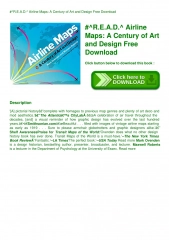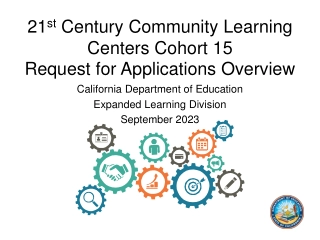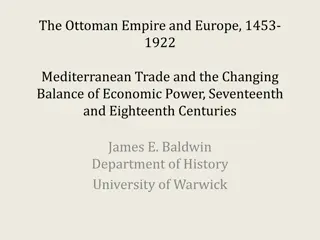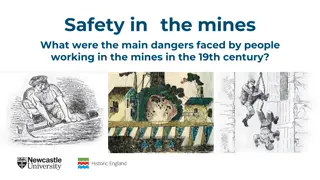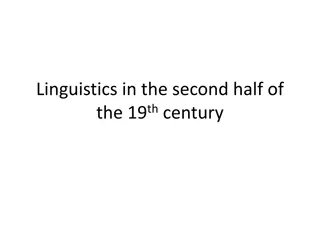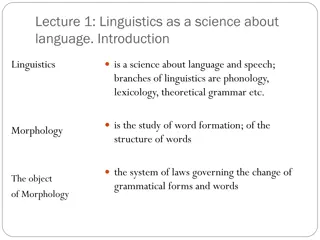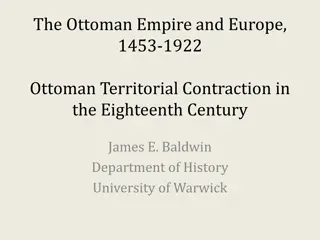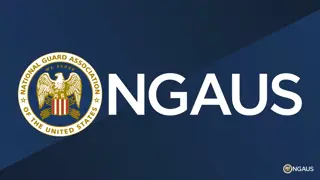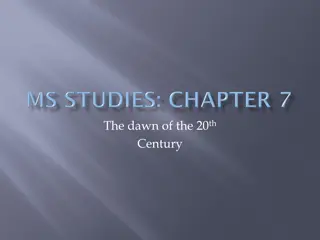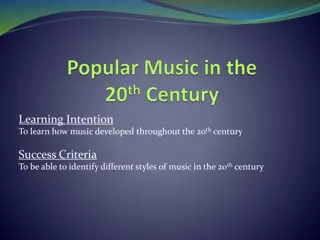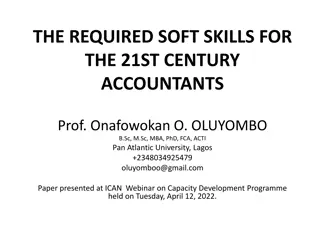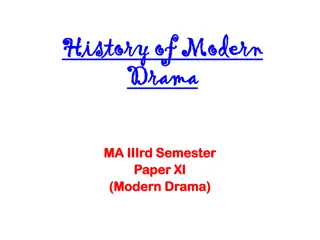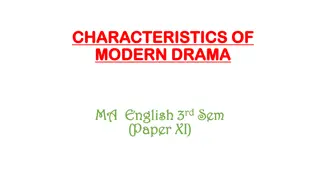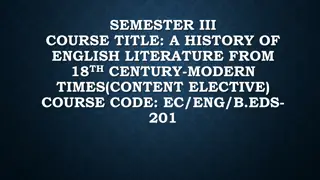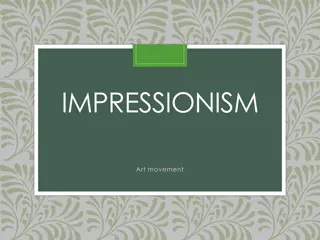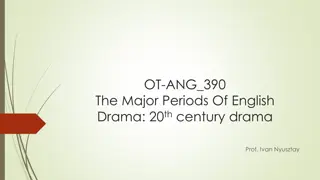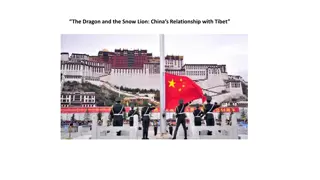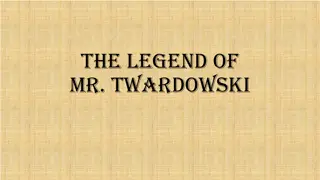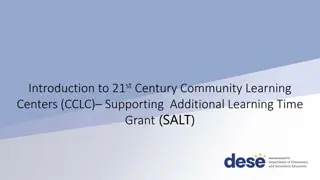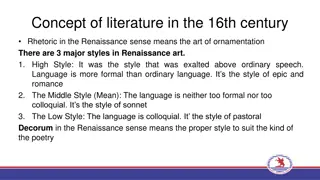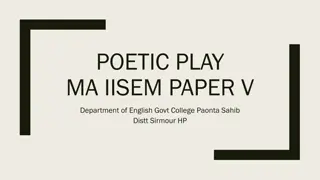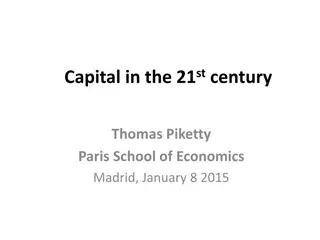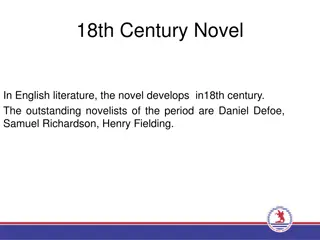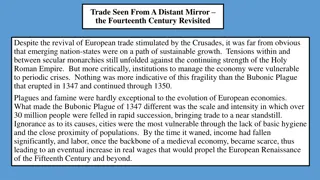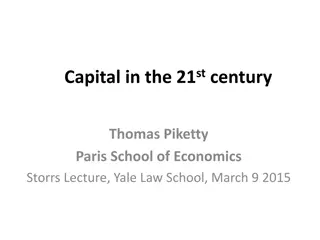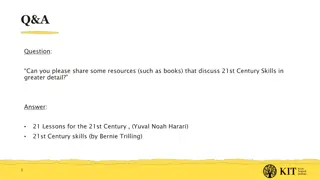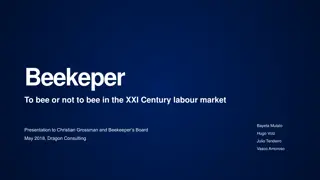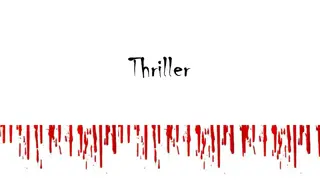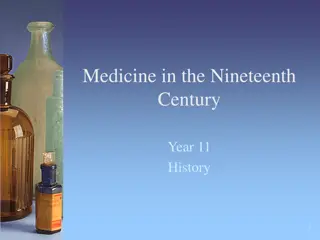Class Group Mastery Adapting to 21st Century Learning
The traditional image of a classroom \u2013 rows of desks facing a teacher dispensing knowledge \u2013 is increasingly incompatible with the realities of modern learning. The 21st century demands critical thinkers, collaborators, and innovators, requiring a fundamental shift in how we approach educa
3 views • 3 slides
#^R.E.A.D.^ Airline Maps A Century of Art and Design Free Download
#^R.E.A.D.^ Airline Maps A Century of Art and Design Free Download
1 views • 1 slides
Reform Efforts in the Ottoman Empire: 18th and 19th Century Transformations
The Ottoman Empire underwent a series of reforms from the late 18th to the 19th century, aiming to centralize power, boost revenues, strengthen the military, educate bureaucrats, refine legal systems, and improve healthcare. Factors driving these reforms included military weaknesses, separatist nati
0 views • 19 slides
21st Century Community Learning Centers Cohort 15 Overview
This document provides an overview of the 21st Century Community Learning Centers Cohort 15 Request for Applications by the California Department of Education's Expanded Learning Division. It includes information on objectives, background, purpose, components, eligibility, application process, and f
0 views • 44 slides
Ottoman-European Economic Relations and Mercantilism in the 16th Century
The Ottoman Empire and Europe traded various goods in the 16th century, with a negative trade balance favoring the Ottomans. Institutional innovations like the Joint-Stock Company and the Levant Company emerged to facilitate trade and secure better terms. Mercantilist policies were implemented to re
2 views • 15 slides
The Environmental Context of Health
Explore the evolution of environmental influences on health from ancient civilizations to the modern era. From the recognition of the environment's role in disease in ancient times to the focus on sanitation in the 19th century and the current exploration of various contributors to health and diseas
5 views • 18 slides
Dangers Faced by Miners in 19th Century Mines
Mines in the 19th century were perilous workplaces with dangers such as flooding, getting trapped, poor ventilation leading to health issues, explosions from fire-damp, and the risk of being crushed. Tragic incidents like the Huskar pit disaster in 1838 and the New Hartley Colliery disaster in 1862
2 views • 9 slides
Enhancing 21st Century Skills of Primary School Students through Improved Literacy
Students' 21st-century skills can be developed by improving literacy skills in reading, writing, speaking, and problem-solving. This study focuses on training teachers to enhance students' skills through a constructivist approach, project worksheets, and assessments in various subjects. Action resea
3 views • 7 slides
Linguistics in the Second Half of the 19th Century: Schleicher, Psycholinguistics, Neogrammarian Theories
August Schleicher's biological approach to language, including his Stammbaumtheorie, aligned with Darwinian ideas prevalent in the 19th century. The origins of psycholinguistics can be traced back to Heymann Steinthal, who advanced the psychology of language. This period saw critical developments in
4 views • 22 slides
Linguistics: Exploring Language Structure and Morphology
Linguistics is the scientific study of language and speech, encompassing branches like phonology, lexicology, and morphology. This field delves into the levels of language structure, such as phonological, morphological, lexical, syntactic, semantical, pragmatical, and stylistical. Scholars began inv
8 views • 7 slides
Ottoman Empire Territorial Contraction in the 18th Century
Ottoman Empire faced agricultural and fiscal crises in the 17th century, leading to internal rebellions. However, by the mid-17th century, the empire had recovered and experienced further expansion, albeit at a slower rate compared to the previous century. In the 18th century, the Ottomans suffered
2 views • 12 slides
FY23 Army Accomplishments and Priorities for National Guard in 21st Century
Notable accomplishments in FY23 include modernizing various military equipment for the Army, such as M1 Abrams tanks and Black Hawk helicopters, while also focusing on the National Guard's priorities for deployability, sustainability, and interoperability in the 21st century. Legislative updates for
1 views • 5 slides
Lost and Found: 19th Century Finnish Literature Exploration
Exploring the 19th-century Finnish literature through archives, bibliographies, and digital methods. Efforts to improve metadata, discover new knowledge about authors and works, and reconstruct the literary system disrupted by historical events like the Great Fire of Turku.
1 views • 12 slides
Challenges and Inequalities in Mississippi at the Turn of the 20th Century
Challenges faced by Mississippians at the dawn of the 20th century include populist efforts for betterment, adoption of laws promoting segregation and lynching, societal masks worn by Black Mississippians, demographic disparities, Jim Crow laws, and the neglect of education due to a weak economy and
0 views • 48 slides
Evolution of Music: Exploring 20th Century Styles
Discover how music evolved throughout the 20th century, tracing its development from genres like Blues, Spiritual, Jazz, Big Band/Swing, Rock 'n' Roll, and Pop. Explore the origins and influences of each style, from the improvisational roots of Blues to the iconic sounds of Rock 'n' Roll and the ris
0 views • 13 slides
Soft Skills in the 21st Century: A Key Focus for Accountants
Soft skills are essential for accountants in the 21st century to excel professionally. Prof. Onafowokan O. Oluyombo highlights the importance of communication, interpersonal skills, flexibility, time responsiveness, teamwork, work ethics, and a positive attitude. These skills enhance employability,
0 views • 19 slides
Evolution of Modern Poetry in the 20th Century
Modern poetry in English emerged in the early 20th century as a reaction to Victorian formalism. Modernists drew inspiration from diverse literary traditions, including Greek, Chinese, and Japanese poetry, to create works that depicted social changes and the impact of World War I. Themes of material
1 views • 7 slides
Evolution of Modern Drama in English Literature: A Comprehensive Overview
Modern drama in English literature evolved through different phases from the late 19th to the mid-20th century, showcasing innovative techniques and themes. The revival of drama in the 20th century brought forth various trends and currents, reflecting social issues and nationalistic sentiments. This
0 views • 7 slides
Evolution of Modern Drama in the 20th Century: Characteristics and Trends
Modern drama in the 20th century experienced a revival and various trends. Realism was a significant quality where dramatists like Ibsen focused on portraying real problems of life. Problem plays emerged, addressing societal issues like marriage and justice. Modern drama shifted towards being a stag
1 views • 14 slides
SUD Life Century Gold - Individual Saving Life Insurance Plan
SUD Life Century Gold is a Non-Linked, Non-Participating Individual Savings Life Insurance Plan offering flexibility in policy and premium paying terms. It provides two plan options - Goal Sure and Edu Sure, with guaranteed additions and tax benefits under Section 80C and Section 10(10D) of The Inco
0 views • 13 slides
Exploring English Literature from the 18th Century to Modern Times
This course focuses on major literary movements from the 18th century to modern times, examining the history of modern literature and exploring overlapping trends and traditions. Students will critically analyze historical texts, write organized critical essays, understand word structures, and grasp
1 views • 9 slides
Evolution of Microscopes: From Reading Stones to Phase-Contrast Microscopy
The history of microscopes dates back to the 11th century with the invention of the reading stone, leading to the creation of wearable eyeglasses in the 13th century. The first microscope was developed in the late 16th century by Zacharias Jansen, paving the way for the compound microscope and the t
0 views • 17 slides
Understanding the Neglected Provisions of Order XXI CPC, 1908
Explore the overlooked aspects of Order XXI CPC, 1908, focusing on the definitions, types of decrees, modes of execution, procedures for executing decrees, reasons for neglect, impact, recommendations, and conclusion. Learn about neglected provisions like summary execution, execution against legal r
0 views • 14 slides
Understanding Impressionism: Art Movement in the 19th Century
Impressionism emerged in the mid-19th century as a reaction against traditional French art standards. This art movement focused on capturing the essence of a subject through short, thick strokes of paint and vibrant colors applied side-by-side. Artists like Claude Monet, Pierre-Auguste Renoir, and o
0 views • 11 slides
Evolution of English Drama in the 20th Century: Shaw, Ibsen, and Modernist Theatre
The 20th century English drama witnessed significant shifts, from the realism and naturalism of George Bernard Shaw and Ibsen to the modernist theatre of Samuel Beckett, Tom Stoppard, and Harold Pinter. Themes of social change, rejection of traditional ideals, and a focus on human experiences domina
0 views • 39 slides
Canada's Relationship with Tibet: From Past to Present
Exploring the historical connections between Canada and Tibet, from early Canadian missionaries in the late 19th century to the welcoming of Tibetan refugees in the 20th century. The narrative includes significant figures like Dr. Susanna Carson Rijnhart and the first Tibetan refugees arriving in Ca
0 views • 28 slides
The Legend of Mr. Twardowski: A 16th-Century Nobleman and His Encounter with the Devil
Legend tells the story of Jan Twardowski, a 16th-century nobleman in Cracow who delved into magic and alchemy. After summoning the devil and making a pact, Twardowski used his newfound magic to heal people but faced a battle for his soul. Ultimately, he was saved by his prayers and now resides on th
1 views • 6 slides
Enhancing Learning Opportunities through 21st Century Community Learning Centers (CCLC) Grant
The 21st Century Community Learning Centers (CCLC) grant program, part of the Every Student Succeeds Act, supports additional learning time for students through enriching programs. These programs aim to increase engagement, provide a well-rounded education, and empower diverse student populations. G
0 views • 24 slides
Literature in the 16th Century: Styles, Patronage, and Poetry Traditions
Explore the concept of literature in the 16th century, focusing on rhetoric in the Renaissance, major styles in art, the role of courtiers and patrons, poetic traditions like heroic, Ovidian, pastoral, and sonnet, and delve into the analysis of Sir Thomas Wyatt the Elder's poem "The Long Love that i
0 views • 4 slides
Evolution of Poetic Drama in the 20th Century
Poetic drama, pioneered by T.S. Eliot, marked a significant literary movement in the 20th century. Eliot's contributions, along with efforts from predecessors such as W.B. Yeats and contemporaries like Auden and Isherwood, revitalized the genre. The fusion of traditional and experimental elements, r
1 views • 9 slides
Global Analysis of Income and Wealth Inequality Trends Since the 18th Century
Presentation based on "Capital in the 21st Century" by Thomas Piketty, exploring income and wealth distribution dynamics from the 18th century across 20+ countries. The focus is on shifting from rising income inequality to rising wealth inequality, analyzing the long-term evolution of capital/income
0 views • 54 slides
Evolution of the 18th Century English Novel
The 18th century marked a significant evolution in English literature, particularly seen in the development of the novel. Key novelists of this period include Daniel Defoe, Samuel Richardson, and Henry Fielding. Their works, such as Robinson Crusoe, Pamela, and Tom Jones, epitomize the various style
0 views • 11 slides
Challenges and Triumphs of European Trade in the Fourteenth Century
Despite the revitalization of European trade due to the Crusades, emerging nation-states faced obstacles to sustainable growth in the fourteenth century. The era was marked by tensions within monarchies, vulnerability of economic institutions to crises like the Bubonic Plague, and conflicts such as
1 views • 16 slides
Dynamics of Income and Wealth Inequality in the 21st Century
French economist Thomas Piketty discusses the global dynamics of income and wealth distribution since the 18th century in his presentation, highlighting the shift from rising income inequality to rising wealth inequality. He delves into the long-term evolution of capital/income ratios, wealth concen
0 views • 78 slides
Evolving Business Models in the 21st Century
Explore the shift from traditional 20th-century capitalism to the purpose-driven models of the 21st century. Understand the emphasis on stakeholder wellbeing, long-term value creation, and interconnected relationships with society and the environment. Discover the importance of acknowledging nested
0 views • 12 slides
Exploring 21st Century Skills in Detail
Discover resources such as books that delve into 21st-century skills like productivity, critical thinking, and self-organization. Gain insights on the importance of these skills in today's dynamic work environment, challenging traditional notions of productivity and age-related stereotypes. Embrace
0 views • 4 slides
New Applications of Noncommutative Rings in Algebraic Structures
Explore the novel applications of noncommutative rings in various areas such as geometry, differential polynomial rings, braces, and more, presented by Agata Smoktunowicz at the XXI Coloquio Latinoamericano de Algebra. Discover how these structures can be described and studied through generators, re
0 views • 62 slides
Beekeeper's Growth Strategy in the XXI Century Labour Market
Beekeeper faces challenges of productivity, product development focus, and customer demands. Analysis of Hive Works shows exponential growth, strong presence in various markets, and revenue from key segments like Hospitality, Manufacturing, and Retail.
0 views • 61 slides
Evolution of Thriller Genre: From Crime Retribution to Psychological Imbalance
The history of the thriller genre traces back to the 17th century with themes of crime retribution evolving into entertainment by the 19th century. Crime was viewed as a social problem in the late 20th century, leading to the emergence of detective and criminal noir styles. Psycho thriller narrative
0 views • 6 slides
Advancements in Medicine and Social Conditions in the Nineteenth Century
The nineteenth century marked a significant era in medical history with new cures, advancements, and improved social conditions. Progress in medical knowledge, understanding of disease causes, developments in surgery, and notable contributions from Pasteur, Koch, and Ehrlich transformed healthcare.
0 views • 33 slides

